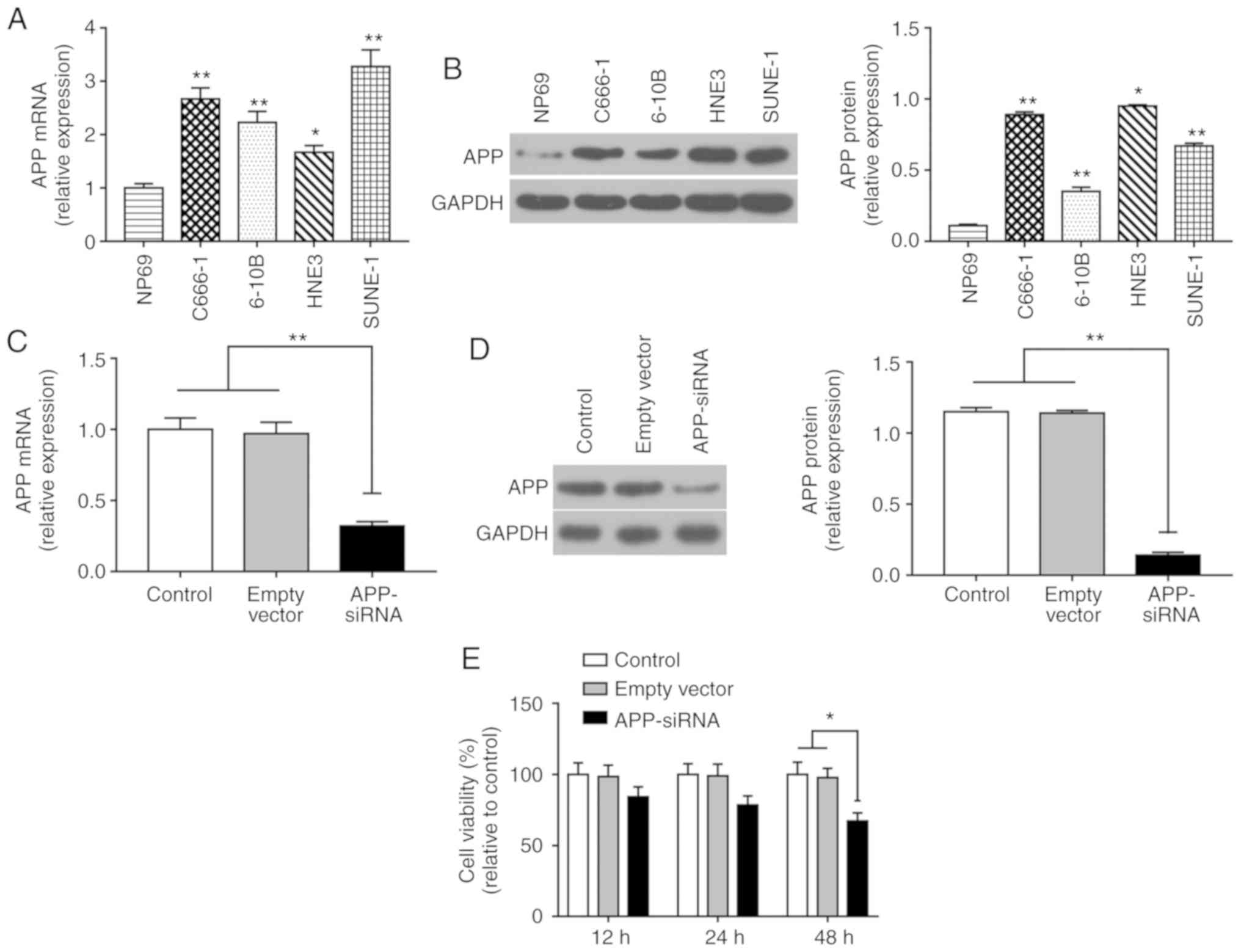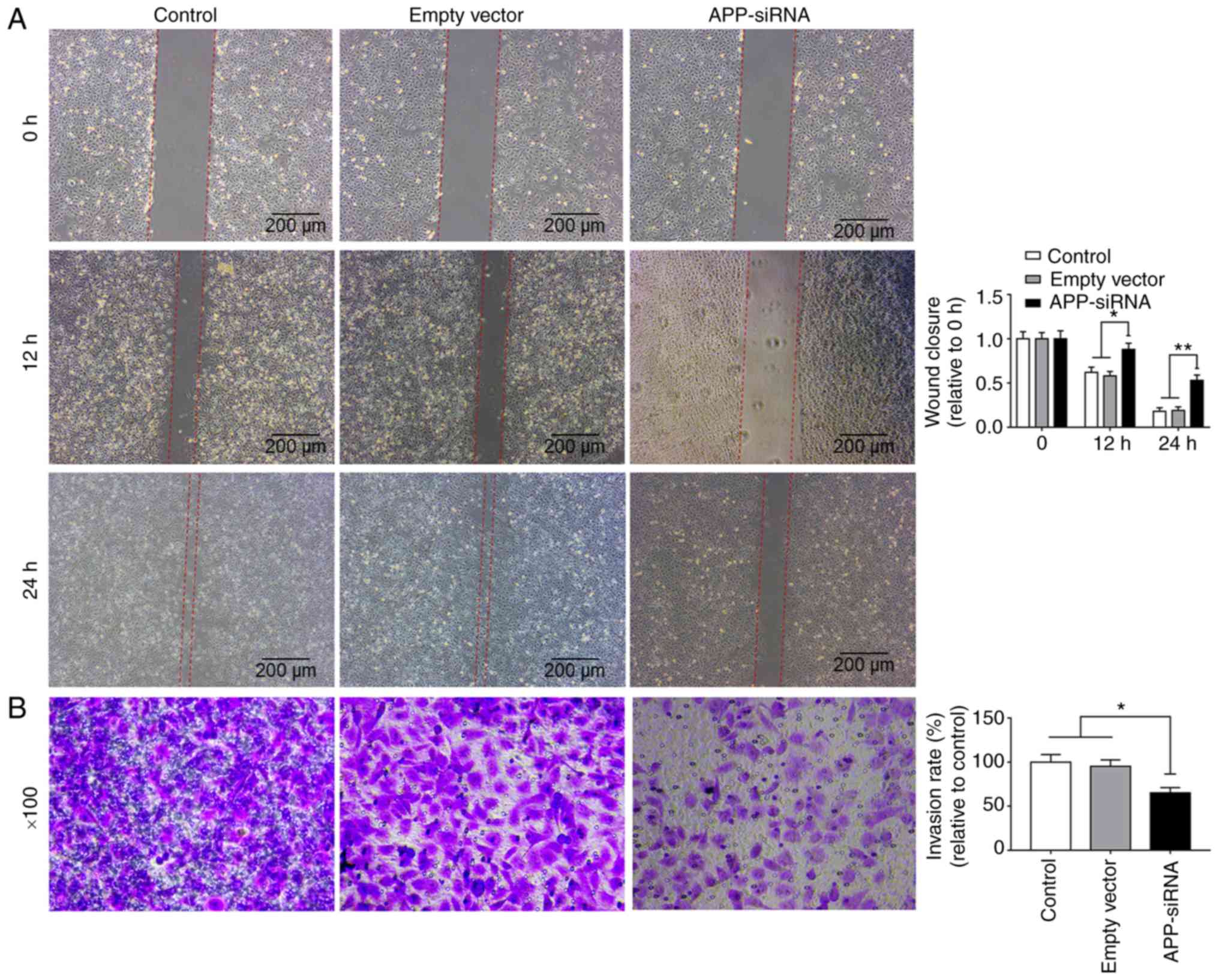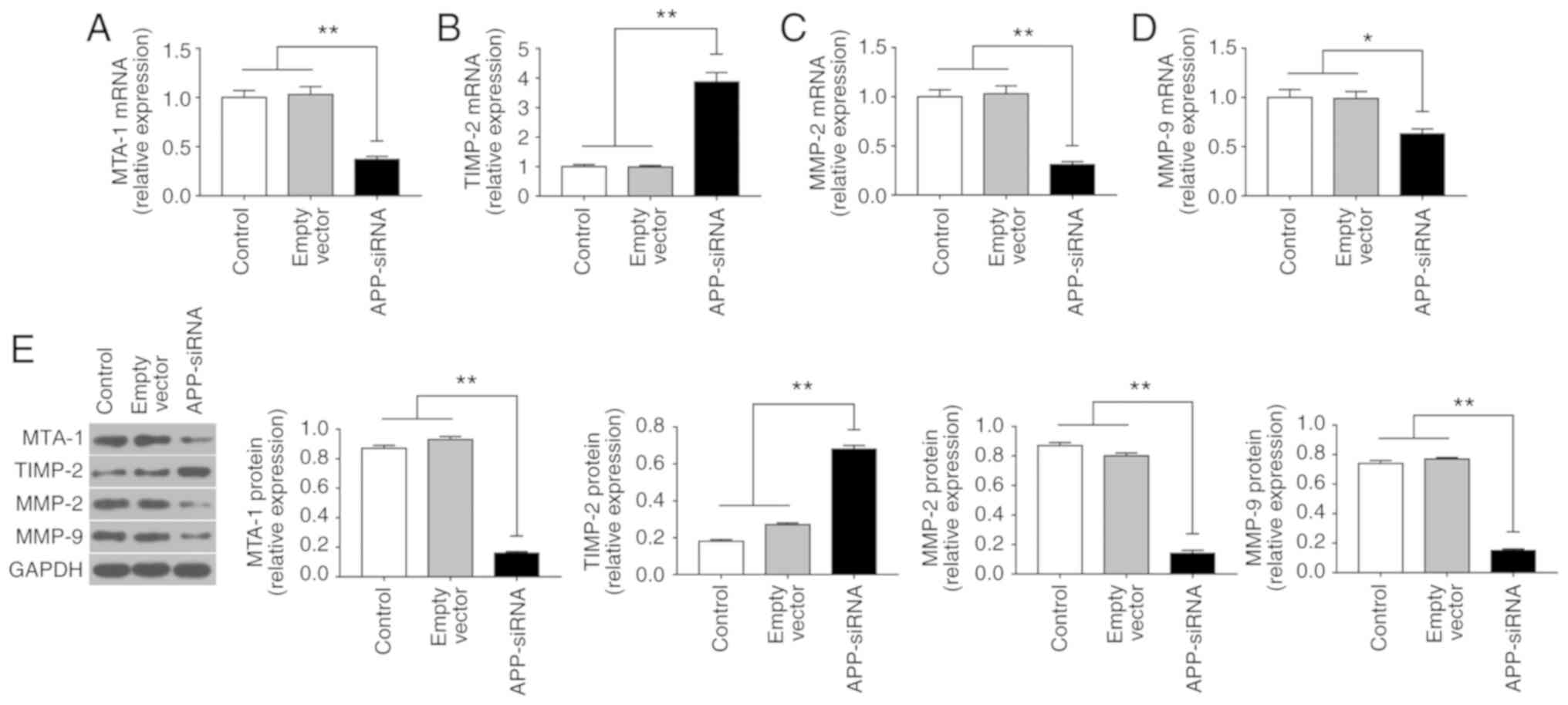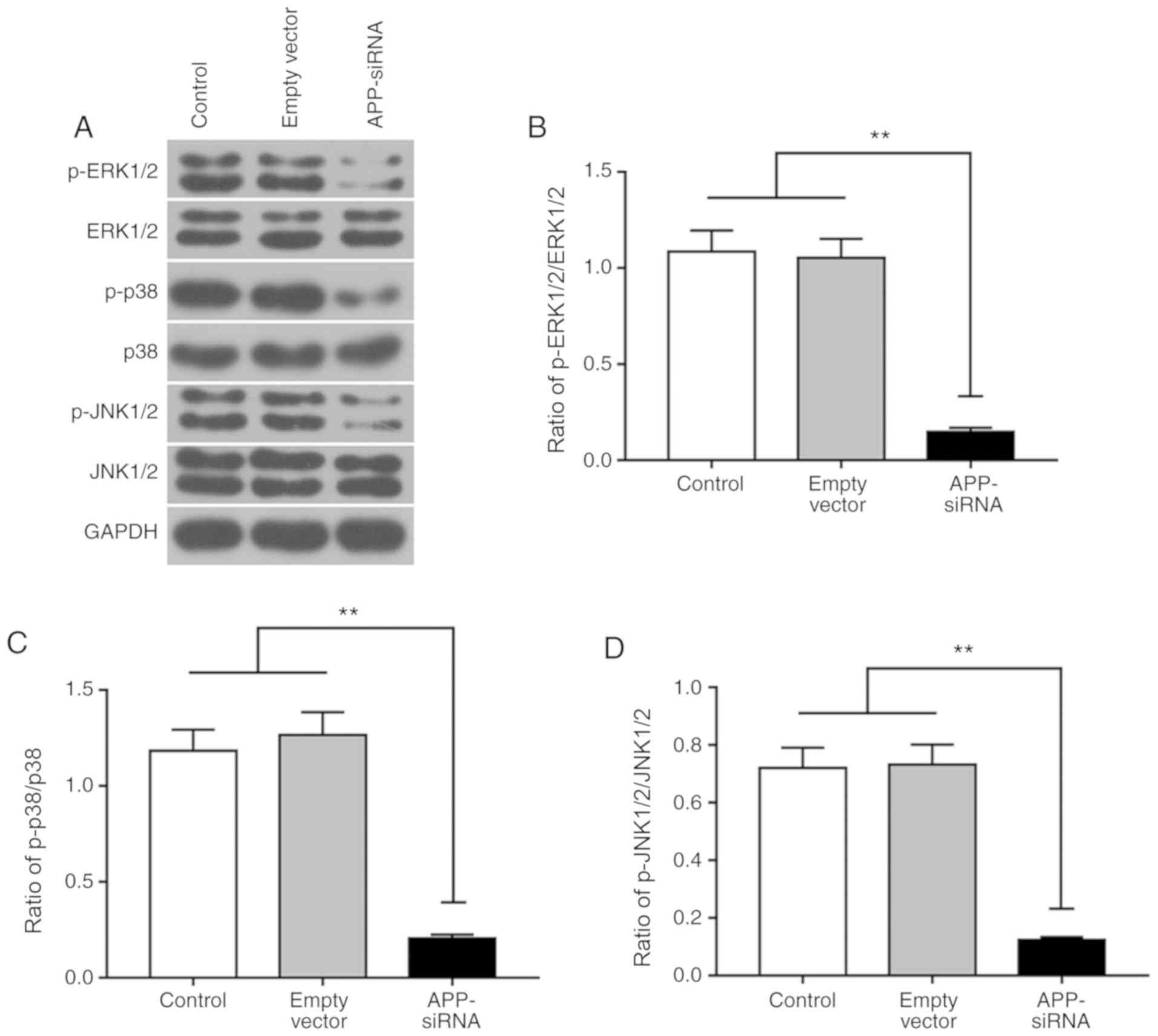|
1
|
Teo PM, Kwan WH, Lee WY, Leung SF and
Johnson PJ: Prognosticators determining survival subsequent to
distant metastasis from nasopharyngeal carcinoma. Cancer.
77:2423–2431. 1996. View Article : Google Scholar : PubMed/NCBI
|
|
2
|
Wan G, Peng XU and Lang J: Research
progress of neoadjuvant chemotherapy for locally advanced
nasopharyngeal carcinoma. Cancer Res Prev Treat. 43:2016.(In
Chinese).
|
|
3
|
Zheng LS, Yang JP, Cao Y, Peng LX, Sun R,
Xie P, Wang MY, Meng DF, Luo DH, Zou X, et al: SPINK6 promotes
metastasis of nasopharyngeal carcinoma via binding and activation
of epithelial growth factor receptor. Cancer Res. 77:579–589. 2017.
View Article : Google Scholar : PubMed/NCBI
|
|
4
|
Liu X, Lu J, He ML, Li Z, Zhang B, Zhou
LH, Li Q, Li G, Wang L, Tian WD, et al: Antitumor effects of
interferon-alpha on cell growth and metastasis in human
nasopharyngeal carcinoma. Current Cancer Drug Targets. 12:561–570.
2012. View Article : Google Scholar : PubMed/NCBI
|
|
5
|
Lee CC, Huang TT, Lee MS, Hsiao SH, Lin
HY, Su YC, Hsu FC and Hung SK: Clinical application of tumor volume
in advanced nasopharyngeal carcinoma to predict outcome. Radiat
Oncol. 5:1–6. 2010. View Article : Google Scholar : PubMed/NCBI
|
|
6
|
Burns WC and Thomas MC: The molecular
mediators of type 2 epithelial to mesenchymal transition (EMT) and
their role in renal pathophysiology. Expert Rev Mol Med.
12:e172010. View Article : Google Scholar : PubMed/NCBI
|
|
7
|
Chakrabarti R, Hwang J, Andres Blanco M,
Wei Y, Lukačišin M, Romano RA, Smalley K, Liu S, Yang Q, Ibrahim T,
et al: Elf5 inhibits the epithelial-mesenchymal transition in
mammary gland development and breast cancer metastasis by
transcriptionally repressing Snail2. Nat Cell Biol. 14:1212–1222.
2012. View
Article : Google Scholar : PubMed/NCBI
|
|
8
|
Tsai JH, Donaher JL, Murphy DA, Chau S and
Yang J: Spatiotemporal regulation of epithelial-mesenchymal
transition is essential for squamous cell carcinoma metastasis.
Cancer Cell. 22:725–736. 2012. View Article : Google Scholar : PubMed/NCBI
|
|
9
|
Li Y and Chen X: miR-4792 inhibits
epithelial-mesenchymal transition and invasion in nasopharyngeal
carcinoma by targeting FOXC1. Biochem Biophys Res Commun.
468:863–869. 2015. View Article : Google Scholar : PubMed/NCBI
|
|
10
|
Gonzalez DM and Medici D: Signaling
mechanisms of the epithelial-mesenchymal transition. Sci Signal.
7:re82014. View Article : Google Scholar : PubMed/NCBI
|
|
11
|
Mccormack N and O'Dea S: Regulation of
epithelial to mesenchymal transition by bone morphogenetic
proteins. Cell Signal. 25:2856–2862. 2013. View Article : Google Scholar : PubMed/NCBI
|
|
12
|
Sun Y, Liu WZ, Liu T, Feng X, Yang N and
Zhou HF: Signaling pathway of MAPK/ERK in cell proliferation,
differentiation, migration, senescence and apoptosis. J Recept
Signal Transduct Res. 35:600–604. 2015. View Article : Google Scholar : PubMed/NCBI
|
|
13
|
Klauzinska M, Castro NP, Rangel MC, Spike
BT, Gray PC, Bertolette D, Cuttitta F and Salomon D: The
multifaceted role of the embryonic gene Cripto-1 in cancer, stem
cells and epithelial-mesenchymal transition. Semin Cancer Biol.
29:51–58. 2014. View Article : Google Scholar : PubMed/NCBI
|
|
14
|
Kubota T, Maruyama S, Abe D, Tomita T,
Morozumi T, Nakasone N, Saku T and Yoshie H: Amyloid beta (A4)
precursor protein expression in human periodontitis-affected
gingival tissues. Arch Oral Biol. 59:586–594. 2014. View Article : Google Scholar : PubMed/NCBI
|
|
15
|
Muratore CR, Rice HC, Srikanth P, Callahan
DG, Shin T, Benjamin LN, Walsh DM, Selkoe DJ and Young-Pearse TL:
The familial Alzheimer's disease APPV717I mutation alters APP
processing and Tau expression in iPSC-derived neurons. Hum Mol
Genet. 23:3523–3536. 2014. View Article : Google Scholar : PubMed/NCBI
|
|
16
|
Ko SY, Lin SC, Chang KW, Wong YK, Liu CJ,
Chi CW and Liu TY: Increased expression of amyloid precursor
protein in oral squamous cell carcinoma. Int J Cancer. 111:727–732.
2004. View Article : Google Scholar : PubMed/NCBI
|
|
17
|
Liang K, Chen ZC, Yi H, Li JL, Zhang P, Li
MY, Li C, Feng XP, Peng F and Xiao ZQ: Screening of EGFR-regulated
secreted proteins in human NPC cell line CNE2. Prog Biochem
Biophys. 34:100–106. 2007.
|
|
18
|
Lai CJ and Tay BH: Pharmacophore-based
screening targeted at upregulated FN1, MMP-9, APP reveals
therapeutic compounds for nasopharyngeal carcinoma. Comput Biol
Med. 69:158–165. 2016. View Article : Google Scholar : PubMed/NCBI
|
|
19
|
Hérard AS, Besret L, Dubois A, Dauguet J,
Delzescaux T, Hantraye P, Bonvento G and Moya KL: siRNA targeted
against amyloid precursor protein impairs synaptic activity in
vivo. Neurobiol Aging. 27:1740–1750. 2006. View Article : Google Scholar : PubMed/NCBI
|
|
20
|
Miller VM, Gouvion CM, Davidson BL and
Paulson HL: Targeting Alzheimer's disease genes with RNA
interference: An efficient strategy for silencing mutant alleles.
Nucleic Acids Res. 32:6612004. View Article : Google Scholar : PubMed/NCBI
|
|
21
|
Shyam R, Ren Y, Lee J, Braunstein KE, Mao
HQ and Wong PC: Intraventricular delivery of siRNA nanoparticles to
the central nervous system. Mol Ther Nucleic Acids. 4:e2422015.
View Article : Google Scholar : PubMed/NCBI
|
|
22
|
Zhao YJ, Han HZ, Liang Y, Shi CZ, Zhu QC
and Yang J: Alternative splicing of VEGFA, APP and NUMB genes in
colorectal cancer. World J Gastroenterol. 21:6550–6560. 2015.
View Article : Google Scholar : PubMed/NCBI
|
|
23
|
Huang Y, An L, Hui KM, Ren Q and Wang W:
An LDLa domain-containing C-type lectin is involved in the innate
immunity of Eriocheir sinensis. Dev Comp Immunol. 42:333–344. 2014.
View Article : Google Scholar : PubMed/NCBI
|
|
24
|
Livak KJ and Schmittgen TD: Analysis of
relative gene expression data using real-time quantitative PCR and
the 2(-Delta Delta C(T)) method. Methods. 25:402–408. 2001.
View Article : Google Scholar : PubMed/NCBI
|
|
25
|
Hugo H, Ackland ML, Blick T, Lawrence MG,
Clements JA, Williams ED and Thompson EW: Epithelial-mesenchymal
and mesenchymal-epithelial transitions in carcinoma progression. J
Cell Physiol. 213:374–383. 2007. View Article : Google Scholar : PubMed/NCBI
|
|
26
|
Meng J, Kataoka H, Itoh H and Koono M:
Amyloid beta protein precursor is involved in the growth of human
colon carcinoma cell in vitro and in vivo. Int J Cancer. 92:31–39.
2015. View Article : Google Scholar
|
|
27
|
Tang CE, Guan YJ, Yi B, Li XH, Liang K,
Zou HY, Yi H, Li MY, Zhang PF, Li C, et al: Identification of the
amyloid β-protein precursor and cystatin C as novel epidermal
growth factor receptor regulated secretory proteins in
nasopharyngeal carcinoma by proteomics. J Proteome Res.
9:6101–6111. 2010. View Article : Google Scholar : PubMed/NCBI
|
|
28
|
Wang C, Chen K, Liao S, Gu W, Lian X,
Zhang J, Gao X, Liu X, Wang T, He QY, et al: The flightless I
protein interacts with RNA-binding proteins and is involved in the
genome-wide mRNA post-transcriptional regulation in lung carcinoma
cells. Int J Oncol. 51:347–361. 2017. View Article : Google Scholar : PubMed/NCBI
|
|
29
|
Kraljevic Pavelic S, Sedic M, Bosnjak H,
Spaventi S and Pavelic K: Metastasis: New perspectives on an old
problem. Mol Cancer. 10:222011. View Article : Google Scholar : PubMed/NCBI
|
|
30
|
Shi Q, Song X, Wang J, Gu J, Zhang W, Hu
J, Zhou X and Yu R: FRK inhibits migration and invasion of human
glioma cells by promoting N-cadherin/β-catenin complex formation. J
Mol Neurosci. 55:32–41. 2015. View Article : Google Scholar : PubMed/NCBI
|
|
31
|
Li H, Wang Z, Zhang W, Qian K, Liao G, Xu
W and Zhang S: VGLL4 inhibits EMT in part through suppressing
Wnt/β-catenin signaling pathway in gastric cancer. Med Oncol.
32:832015. View Article : Google Scholar : PubMed/NCBI
|
|
32
|
Eiró N, Fernandezgarcia B, Vázquez J,
Casar JMD, González LO and Vizoso FJ: A phenotype from tumor stroma
based on the expression of metalloproteases and their inhibitors,
associated with prognosis in breast cancer. Oncoimmunology.
4:e9922222015. View Article : Google Scholar : PubMed/NCBI
|
|
33
|
Salimi Sartakhti J, Manshaei MH and
Sadeghi M: MMP-TIMP interactions in cancer invasion: An
evolutionary game-theoretical framework. J Theor Biol. 412:17–26.
2017. View Article : Google Scholar : PubMed/NCBI
|
|
34
|
Zhu X, Guo Y, Li X, Ding Y and Chen L:
Metastasis-associated protein 1 nuclear expression is associated
with tumor progression and clinical outcome in patients with
non-small cell lung cancer. J Thorac Oncol. 5:1159–1166. 2010.
View Article : Google Scholar : PubMed/NCBI
|
|
35
|
Higashijima J, Kurita N, Miyatani T,
Yoshikawa K, Morimoto S, Nishioka M, Iwata T and Shimada M:
Expression of histone deacetylase 1 and metastasis-associated
protein 1 as prognostic factors in colon cancer. Oncol Rep.
26:343–348. 2011.PubMed/NCBI
|
|
36
|
Prisco MG, Zannoni GF, De Stefano I,
Vellone VG, Tortorella L, Fagotti A, Mereu L, Scambia G and Gallo
D: Prognostic role of metastasis tumor antigen 1 in patients with
ovarian cancer: A clinical study. Hum Pathol. 43:282–288. 2012.
View Article : Google Scholar : PubMed/NCBI
|
|
37
|
Wan XB, Long ZJ, Yan M, Xu J, Xia LP, Liu
L, Zhao Y, Huang XF, Wang XR, Zhu XF, et al: Inhibition of Aurora-A
suppresses epithelial–mesenchymal transition and invasion by
downregulating MAPK in nasopharyngeal carcinoma cells.
Carcinogenesis. 29:1930–1937. 2008. View Article : Google Scholar : PubMed/NCBI
|
|
38
|
Wang J, Wu Z, Pandey V, Chen Y, Zhu T and
Lobie P: GP1-2: Autocrine human growth hormone suppression of
E-CADHERIN via p44/42 MAPK promotes epithelial-tomesenchymal
transition (EMT) of colorectal carcinoma cells. Eur J Cancer. 50
(Suppl):S292014. View Article : Google Scholar
|
|
39
|
Li NY, Weber CE, Wai PY, Cuevas BD, Zhang
J, Kuo PC and Mi Z: An MAPK-dependent pathway induces
epithelial-mesenchymal transition via Twist activation in human
breast cancer cell lines. Surgery. 179:256–257. 2013.
|
|
40
|
Lin Y, Mallen-St CJ, Wang G, Luo J,
Palma-Diaz F, Lai C, Elashoff DA, Sharma S, Dubinett SM and St John
M: p38 MAPK mediates epithelial-mesenchymal transition by
regulating p38IP and Snail in head and neck squamous cell
carcinoma. Oral Oncol. 60:81–89. 2016. View Article : Google Scholar : PubMed/NCBI
|
|
41
|
Lin ZH, Wang L, Zhang JB, Liu Y, Li XQ,
Guo L, Zhang B, Zhu WW and Ye QH: MST4 promotes hepatocellular
carcinoma epithelial-mesenchymal transition and metastasis via
activation of the p-ERK pathway. Int J Oncol. 45:629–640. 2014.
View Article : Google Scholar : PubMed/NCBI
|
|
42
|
Yu H, Zhang L and Liu P: CXCR7 signaling
induced epithelial-mesenchymal transition by AKT and ERK pathways
in epithelial ovarian carcinomas. Tumour Biol. 36:1679–1683. 2015.
View Article : Google Scholar : PubMed/NCBI
|
|
43
|
Shi P, Fang C and Pang X: Astrocyte
elevated gene-1 regulates CCL3/CCR5-induced
epithelial-to-mesenchymal transition via Erk1/2 and Akt signaling
in cardiac myxoma. Oncol Rep. 34:1319–1326. 2015. View Article : Google Scholar : PubMed/NCBI
|
|
44
|
Zhang Q, Li X, Li X, Li X and Chen Z:
LncRNA H19 promotes epithelial-mesenchymal transition (EMT) by
targeting miR-484 in human lung cancer cells. J Cell Biochem.
119:4447–4457. 2018. View Article : Google Scholar : PubMed/NCBI
|
|
45
|
Li H, Li Y, Liu D and Liu J: LPS promotes
epithelial-mesenchymal transition and activation of TLR4/JNK
signaling. Tumour Biol. 35:10429–10435. 2014. View Article : Google Scholar : PubMed/NCBI
|
|
46
|
Epstein Shochet G, Tartakover-Matalon S,
Drucker L, Pasmanik-Chor M, Pomeranz M, Fishman A and Lishner M:
Placenta-breast cancer cell interactions promote cancer cell
epithelial mesenchymal transition via TGFbeta/JNK pathway. Clin Exp
Metastasis. 31:961–975. 2014. View Article : Google Scholar : PubMed/NCBI
|
|
47
|
Takahashi E, Haga A and Tanihara H: Merlin
regulates epithelial-to-mesenchymal transition of ARPE-19 Cells via
TAK1-p38MAPK-mediated activation. Invest Ophthalmol Vis Sci.
56:2449–2458. 2015. View Article : Google Scholar : PubMed/NCBI
|
|
48
|
Ling G, Ji Q, Ye W, Ma D and Wang Y:
Epithelial-mesenchymal transition regulated by p38/MAPK signaling
pathways participates in vasculogenic mimicry formation in SHG44
cells transfected with TGF-β cDNA loaded lentivirus in vitro
and in vivo. Int J Oncol. 49:2387–2398. 2016. View Article : Google Scholar : PubMed/NCBI
|


















